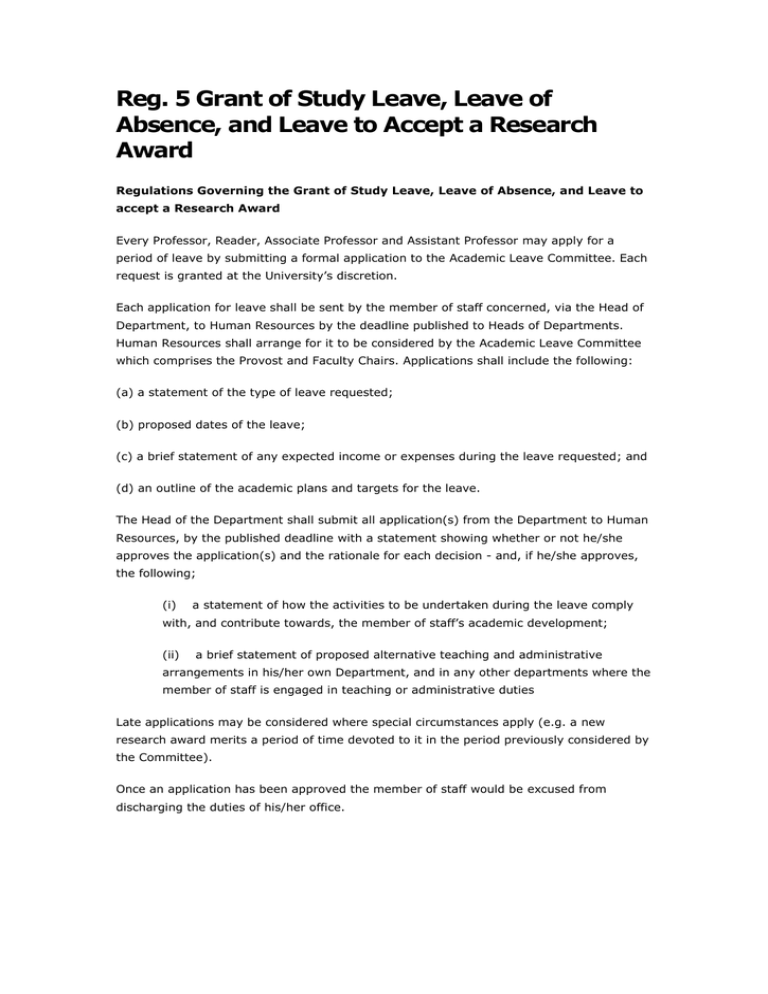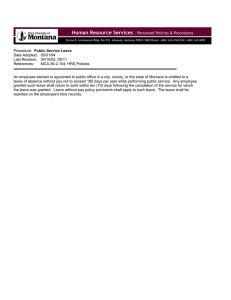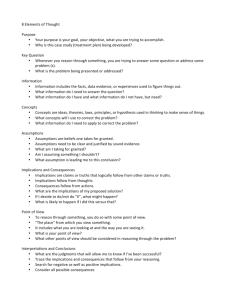Reg. 5 Grant of Study Leave, Leave of Award
advertisement

Reg. 5 Grant of Study Leave, Leave of Absence, and Leave to Accept a Research Award Regulations Governing the Grant of Study Leave, Leave of Absence, and Leave to accept a Research Award Every Professor, Reader, Associate Professor and Assistant Professor may apply for a period of leave by submitting a formal application to the Academic Leave Committee. Each request is granted at the University’s discretion. Each application for leave shall be sent by the member of staff concerned, via the Head of Department, to Human Resources by the deadline published to Heads of Departments. Human Resources shall arrange for it to be considered by the Academic Leave Committee which comprises the Provost and Faculty Chairs. Applications shall include the following: (a) a statement of the type of leave requested; (b) proposed dates of the leave; (c) a brief statement of any expected income or expenses during the leave requested; and (d) an outline of the academic plans and targets for the leave. The Head of the Department shall submit all application(s) from the Department to Human Resources, by the published deadline with a statement showing whether or not he/she approves the application(s) and the rationale for each decision - and, if he/she approves, the following; (i) a statement of how the activities to be undertaken during the leave comply with, and contribute towards, the member of staff’s academic development; (ii) a brief statement of proposed alternative teaching and administrative arrangements in his/her own Department, and in any other departments where the member of staff is engaged in teaching or administrative duties Late applications may be considered where special circumstances apply (e.g. a new research award merits a period of time devoted to it in the period previously considered by the Committee). Once an application has been approved the member of staff would be excused from discharging the duties of his/her office. (1) Study Leave Applications for Study Leave will be granted subject to the following conditions: (a) Study leave shall be used for academic purposes. (b) Study leave shall normally be granted in the proportion of one term in respect of every six terms of service and shall normally only be granted for a maximum period of one year (three terms), no matter how long the applicant has served. In exceptional circumstances study leave may be granted for one term, but only one term, prior to the completion of the qualifying period. In such a case the term immediately following the period of leave shall count as part of the qualifying period of service. (c) Study leave shall not normally be granted for periods of less than a full academic term. (d) Study leave shall not normally be granted to Heads of Departments for periods during their term of office. (e) Salary may be deducted in respect of study leave granted and shall be determined so that the member of staff shall not be worse off, nor substantially better off, than if they had not been granted study leave and, in particular, the following will be taken into account: (i) income from any new sources; (ii) additional expenses or loss of income arising from the period of study leave. (2) Leave of Absence Leave of absence may be granted for academic purposes and such leave of absence shall normally be unpaid, but salary need not be withheld if the period of absence requested includes only a short period of absence from the University. (3) Leave to Accept a Research Award Leave to accept a research award may be granted under two categories: (a) (i) Leave to accept a Personal Research Fellowship Leave may be granted with salary to accept an award of a personal research fellowship from a Research Council, Foundation, or other awarding bodies, obtained after a competitive selection process and/or where the award is a mark of academic distinction. (ii) Applications for leave under this category must be made with the support of the Head of Department, and be received by Human Resources not later than the date of the application for the award. The Academic Leave Committee will formally consider the request for leave on notification that an individual’s application for a personal research fellowship has been successful. (b) (i) Leave in order to accept a Research Grant Leave may be granted with salary to undertake research associated with the award of a research grant, provided that the grant has been obtained by a competitive process of peer review from one of the following Research Councils or other sponsoring bodies of equivalent recognised status: Arts and Humanities Research Council Biotechnology and Biological Sciences Research Council Economic and Social Research Council Engineering and Physical Sciences Research Council European Research Council Medical Research Council Natural Environment Research Council Science and Technology Facilities Council Cancer Research Campaign Leverhulme Trust Nuffield Foundation Royal Society Wellcome Trust Wolfson Foundation Note: The above is not an exclusive list. Applications for leave associated with research grants from other awarding bodies require a case to be made by the Head of the Department establishing, to the satisfaction of the Academic Leave Committee, that the body in question has status comparable to that of a Research Council and confirming that its grants are awarded by a competitive process of peer-review (see also (ii) below). (ii) Applications for leave to accept a research grant must be made with the support of the Head of Department, and be received by Human Resources no later than the date of the application for the grant. The Academic Leave Committee will formally consider the request for leave on notification that an individual’s application for the grant has been successful. However, in cases where an application involving leave is made to a body not listed above, prior approval from the Provost and relevant Faculty Chair is required before the application for the grant is made. (iii) The Head of the Department must ensure that the application for the grant makes sufficient provision for the full costs of replacement teaching during the period of the leave. (iv) Leave to accept a research grant shall not normally be granted for periods of less than a full term and not more than one term for each year of a research grant. (4) (a) General In calculating the length of qualifying service for study leave, any term, terms, or parts of terms, for which the applicant has been granted study leave, leave of absence, or leave to accept a Research Award under these Regulations, shall be deducted from the total period of qualifying service. It should be noted that this also applies for leave taken for a Career Break or Warwick Academic Returners Fellowship. For periods of absence of less than a term, it shall be a matter of the Provost’s discretion whether or not such periods be deducted from the total period of service. (b) Leave shall not be granted unless the Provost or relevant Faculty Chair is satisfied that adequate provision has been or will be made for the performance of the applicant’s duties during the period of leave. (c) Where unpaid leave of absence is granted, the normal expectation is that the body funding the leave, or the alternative employing institution will be responsible for meeting the employer’s share of pension contributions. Where this is not possible, the application for leave should make it clear that the University is being asked to continue payment of the employer’s contributions, and a full statement of the financial arrangements to be made during the period of leave should be provided by the applicant. Please note unless notified by the Department the employer’s contributions will cease. (d) If an applicant becomes eligible to receive a salary from an outside source after the application has been approved, he/she shall notify the Provost (via Human Resources) of the changes in his/her circumstances and the Provost may reconsider the decision about the deduction of salary for the period concerned. (e) .(e) In considering applications for leave received from a Head of Department, the Academic Leave Committee shall take into account the number of staff on all categories of leave from a Department in any one year. The Committee will not normally approve applications for leave if, in doing so, the number of staff on leave for any given term exceeds 20% of the total number of staff available to the Department in that term. (f) The appropriate application under these Regulations should be made whenever a member of staff wishes to be absent for a period of 1 term or more. Applications for short periods of leave of less than one term will normally be dealt with by the Head of Department. (g) An application shall also be submitted in any case where a member of research staff wishes to be absent from the University for purposes not connected with the research project on which he/she is engaged. This will normally be in a situation where the member of staff will be relinquishing their University salary to take up a visiting appointment. The application for leave should be submitted via the Head of Department/Director of the Research Centre or Unit, to Human Resources who will arrange for it to be considered by the Academic Leave Committee. (h) While Teaching Only staff do not accrue entitlement to apply for study leave, individual applications for leave may be considered by the Academic Leave Committee on a case-by-case basis. Leave will not be granted to support the development of a research portfolio. (i) A register of leave requested and granted under these Regulations will be maintained by Human Resources, and will be available when applications are considered. (j) An annual report of leave requested and granted under these Regulations is sent to the Deputy Registrar’s Office. (k) It shall be a requirement of all leave granted under these Regulations, that the member of staff should submit a report to the Academic Leave Committee, via the Head of Department, within four weeks of the end of the period of absence detailing the use made of the leave. No further requests for Study Leave from a Department will normally be considered where reports are outstanding.


